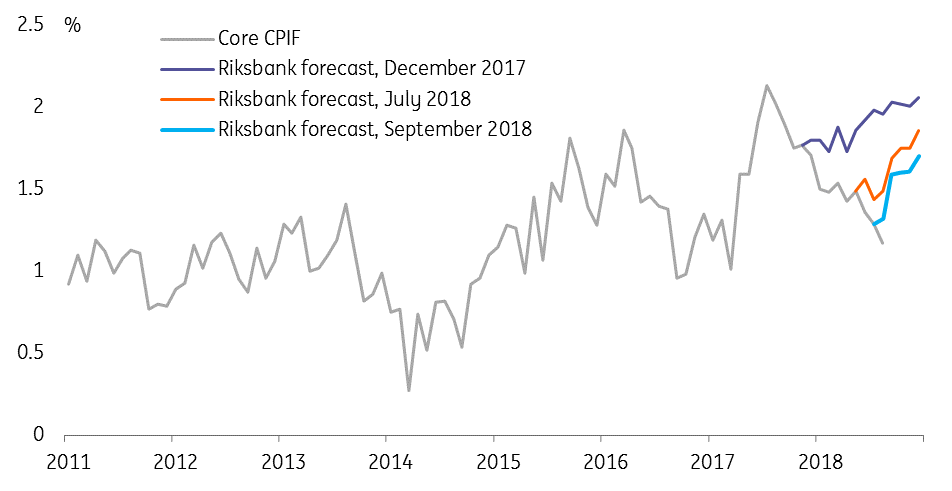Sweden: Inflation disappoints again
Yet again Swedish inflation came in weaker than expected, with core inflation for August falling to 1.2%. This will worry the already ultra-cautious majority on the Riksbank monetary policy committee
Headline CPIF inflation in August was 2.2%, unchanged from July, while core inflation fell to 1.2% (from 1.3% in July). This was lower than the consensus expectation and the Riksbank's forecast (published only last week), mainly due to core inflation coming in weaker than anticipated. This was the seventh month out eight this year that the Riksbank's core inflation forecast has proven too optimistic, despite the central bank continuously shifting its forecast downwards.
The decline in core inflation was fairly broad-based, with several components coming in slightly lower than expected. While some of the weakness can be attributed to volatile air travel and package holiday prices, which might be expected to bounce back, the broad-based move lower is concerning. Energy prices were roughly in line with expectations, but the contribution from energy is likely to start falling back over coming months as electricity prices fall (as autumn rain fills up the hydropower dams in the north, exerting downward pressure on prices) and oil price base effects kick in.

However, there are some bright spots for the Riksbank in today's data. Service price inflation increased to 1.5% (from 1.2% in July) while inflation for imported goods and services fell to 0.8 (from 1.2%). This may give some comfort to the Riksbank, which has long seen service inflation as key to sustained domestic price pressure. Given the weakness of the krona, import prices are likely to pick up over the autumn. If service prices have broken the downward trend from the past year, that suggests the Riksbank may eventually get the stronger core inflation it is looking for.
For the central bank, today's figures are a concern, in particular coming after yesterday's downward revision to GDP growth. But a couple of poor data points are not enough to shift the Riksbank away from its intention to raise interest rates in December or February, and as discussed, today's data release is not entirely negative. While a February hike now looks considerably more likely than December, it will take more negative developments to shift the Riksbank further into 2019. We still consider a first rate hike later in 2019 as more likely than not, but are waiting for the Riksbank minutes on Monday to judge how definitive the central bank's latest guidance really is.
This publication has been prepared by ING solely for information purposes irrespective of a particular user's means, financial situation or investment objectives. The information does not constitute investment recommendation, and nor is it investment, legal or tax advice or an offer or solicitation to purchase or sell any financial instrument. Read more
Tags
SwedenDownload
Download snap